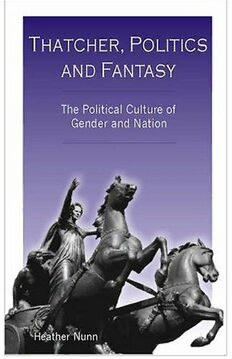
Thatcher, Politics and Fantasy: The Political Culture of Gender and Nation PDF
206 Pages·2003·1.941 MB·English
Most books are stored in the elastic cloud where traffic is expensive. For this reason, we have a limit on daily download.
Preview Thatcher, Politics and Fantasy: The Political Culture of Gender and Nation
Description:
The powerful image of Margaret Thatcher behind the wheel of a tank, a modern day Britannia with her headscarf trailing in the breeze, in many ways epitomises the themes of this book. Drawing on a wide range of material - speeches, press photos, campaign posters, radio interviews, magazine articles, political biographies - this well-documented and scholarly analysis shows the interplay of gender, fantasy and conflict in the construction of the Thatcher persona, and the complex ways in which her politics resonated with the fears and desires of the British electorate. Nunn opens up a space for thinking in new ways about the relationship between the categories of woman and nation, of political power and violence. She explores the role of particular forms of femininity and masculinity in securing imaginary constructions of political leadership and national identity, in which fantasies of mastery and invasion come to the fore. The book addresses Thatcher's performance of grand adversarial leadership: the image of Thatcher at war, as constantly embattled, recurs again and again; she is presented as a woman encountering opposition, danger and hostility, at all levels - personal, party, doctrinal, civil, national and international level. And in all these battles, gender is crucial to Thatcher's persona: whether she appears as the doughty "Tory woman", responding punitively to immorality, crime and disorder; as the commonsense housewife bringing order to the nation's house-keeping; as the warrior queen fighting the enemy without and within; or as the Iron Lady - the "best man" for the job. Nunn argues that our unconscious desires and fantasies play an important part in the symbolic identifications that are crucial in modern politics. Thatcher's positioning in relation to images of social chaos and violent unrest thus rehearsed a range of aggressive and submissive fantasy scenarios in which she or her loyal subjects faced a host of malefactors, oppressive state structures, or potential emasculating dependencies. Nunn also explores the idea of Thatcher as a "cultural super-ego", as a way of understanding how Thatcher's imaginary power was consolidated through an ambivalent laying bare of illegitimate violence, and a counter-investment in the violence of the state and the law. She suggests that in examining Thatcher's extreme persona one can start to consider the violence and aggression that underpin the modern British nation.
See more
The list of books you might like
Most books are stored in the elastic cloud where traffic is expensive. For this reason, we have a limit on daily download.
